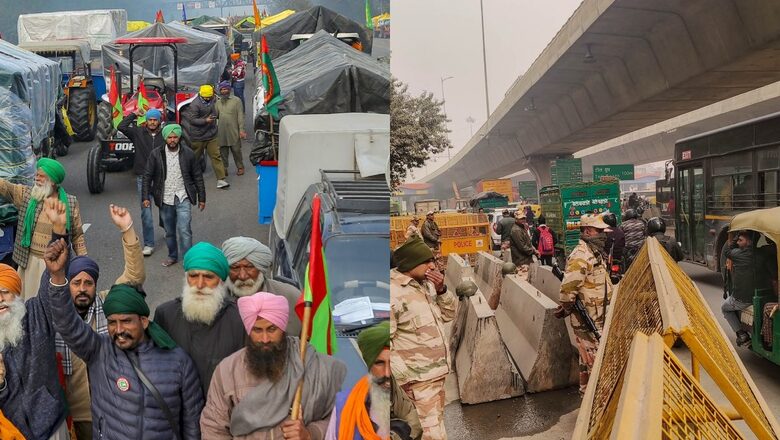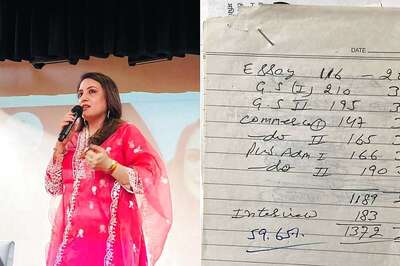
views
The Delhi Chalo march of protesting farmers has also set in motion competitive politics to woo them and favourably shape public perception as the Lok Sabha elections near.
The Bharatiya Janata Party, which is in power at the Centre, has been listing out the many initiatives of the Narendra Modi government that have benefited the farming community, such as the Pradhan Mantri Kisan Samman Nidhi, Pradhan Mantri Fasal Bima Yojana, increase in minimum support price (MSP), Soil Health Card Scheme, National Agriculture Market, Pradhan Mantri Kisan Samriddhi Kendras, Pradhan Mantri Kisan SAMPADA Yojana, etc.
Under PM Modi's leadership, the PM-KISAN has emerged as a blessing to small and marginal farmers.– PM Modi#AnnadataKaSamman pic.twitter.com/ellRn7JXD7
— BJP (@BJP4India) February 13, 2024
Our farmers are the 'Annadatas'. When our farmers prosper, India will prosper.– PM Modi#AnnadataKaSamman pic.twitter.com/yhOai5SyQr
— BJP (@BJP4India) February 13, 2024
In the thick of the farmer protests on Tuesday, the Congress came out with a big-bang announcement. Its MP Rahul Gandhi posted on social media that his party promises a “legal guarantee” to every farmer that they will receive the minimum support price (MSP) for their crops as per the Swaminathan Commission, “which would benefit 15 crore farming families”.
किसान भाइयों आज ऐतिहासिक दिन है!कांग्रेस ने हर किसान को फसल पर स्वामीनाथन कमीशन के अनुसार MSP की कानूनी गारंटी देने का फैसला लिया है।
यह कदम 15 करोड़ किसान परिवारों की समृद्धि सुनिश्चित कर उनका जीवन बदल देगा।
न्याय के पथ पर यह कांग्रेस की पहली गारंटी है।#KisaanNYAYGuarantee
— Rahul Gandhi (@RahulGandhi) February 13, 2024
Foremost among the demands of the protesters is the enactment of a law guaranteeing MSP, or minimum support price, for crops, which is a crucial financial lifeline for farmers facing market uncertainties. A legal backing for MSP was among the demands in protests four years ago as well.
Other key demands are the repeal of the Electricity Act of 2020, compensation for farmers killed in UP’s Lakhimpur Kheri, and withdrawal of police cases against those involved in the last protest.
Two union ministers, including junior agriculture minister Arjun Munda, met farmer leaders late on Monday to discuss these and other demands. Some progress was made — an agreement was struck on repealing the Electricity Act and on compensation for farmers killed in Lakhimpur Kheri.
However, there was no resolution of the farmers’ primary concerns — a law to guarantee MSP for all crops, loan waivers, and implementation of the Swaminathan Commission’s recommendations. And the protests began.
Delhi has been fortified to stop the protesters from entering the city. Key border points including Ghazipur, Tikri and Singhu have been barricaded while concrete blocks and nails have been erected on the roads to prevent tractors and trollies from crossing into the city. Long queues of cars were seen on the highways at Ghazipur and Chilla borders, which connect Delhi with Ghaziabad and Noida in Uttar Pradesh, as well as other parts of NCR.
The government proposes the formation of a committee to deliberate on legal guarantees for MSP, debt waivers, and the implementation of the Swaminathan Commission’s recommendations. However, farmer representatives remain unconvinced.
The Swaminathan Commission was set up in 2004 and submitted five reports, with the last one in October 2006. Last week, the government announced the Bharat Ratna, India’s highest civilian honour, for the head of the commission, Dr MS Swaminathan.
The panel had recommended that MSP should be fixed at a level which is at least 50 per cent higher than the cost of production of any crop.




















Comments
0 comment